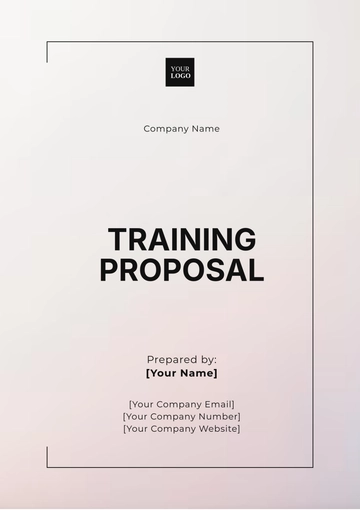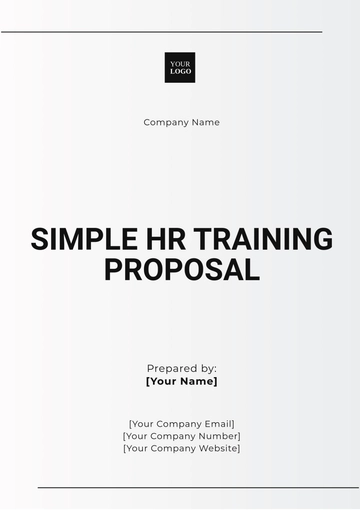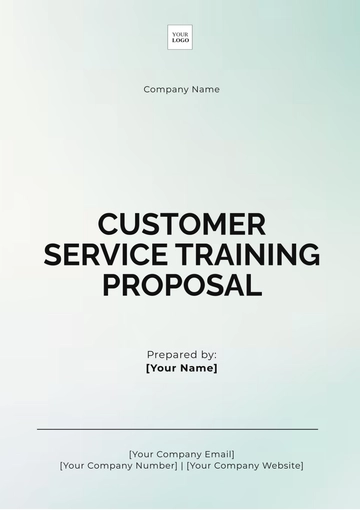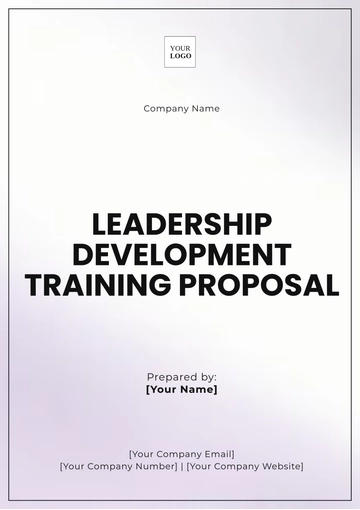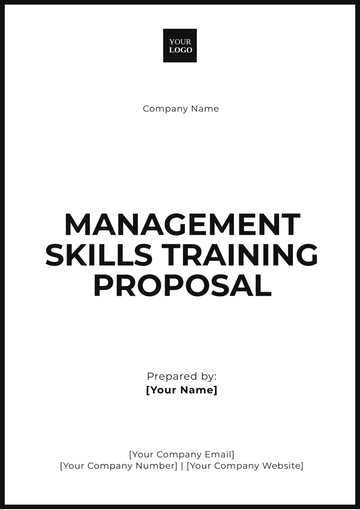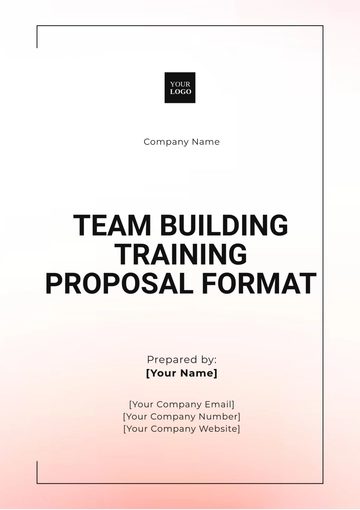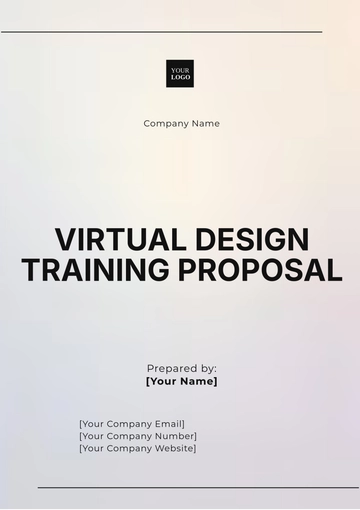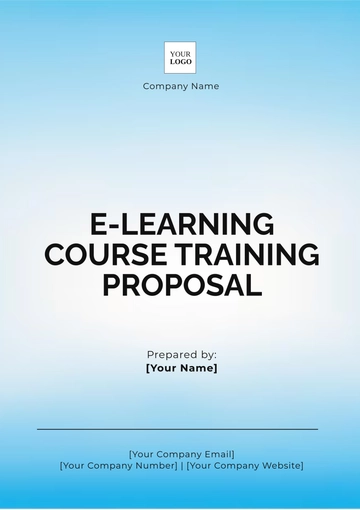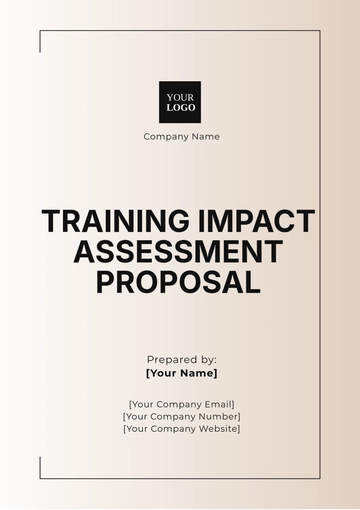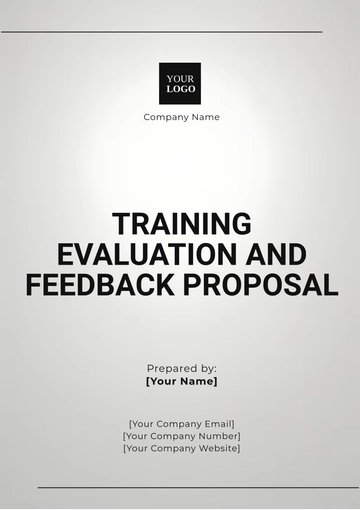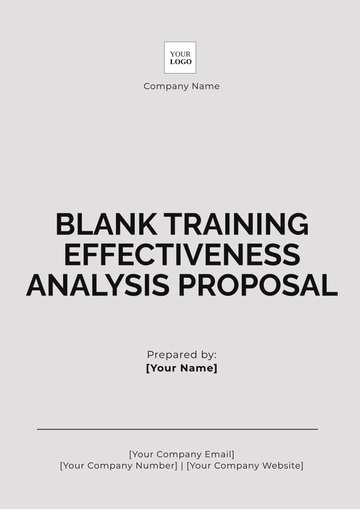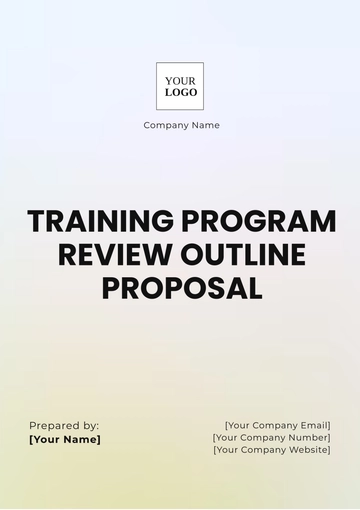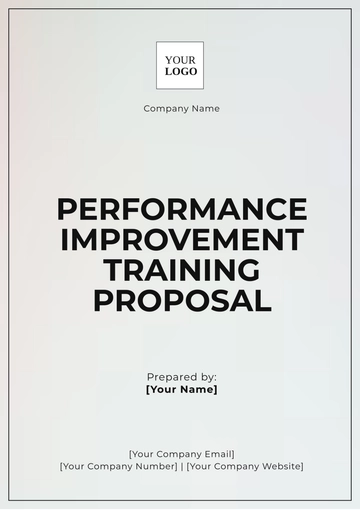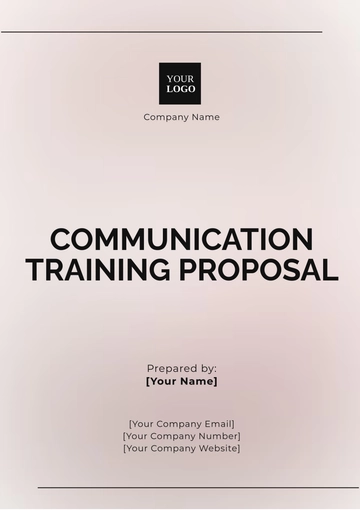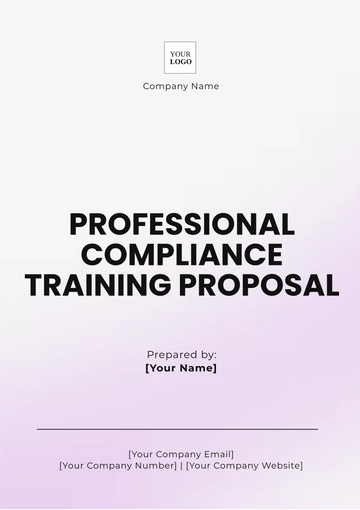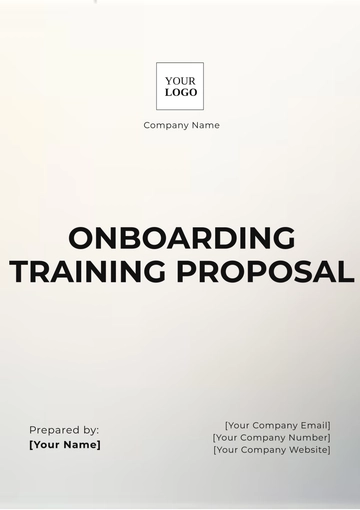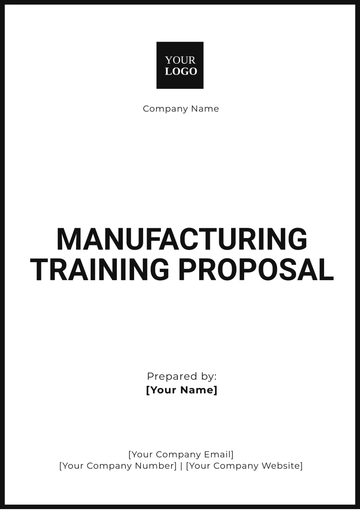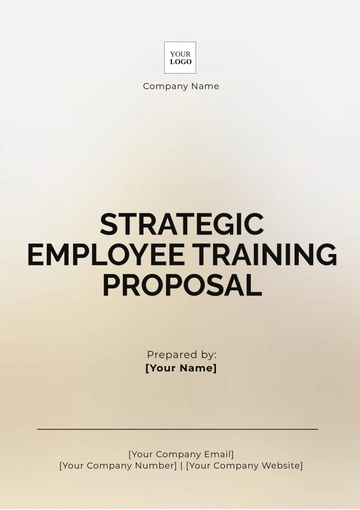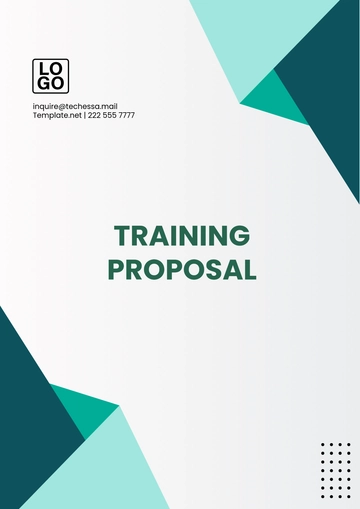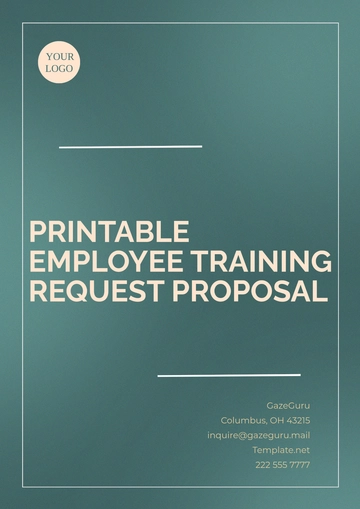Free Leadership Development Training Proposal
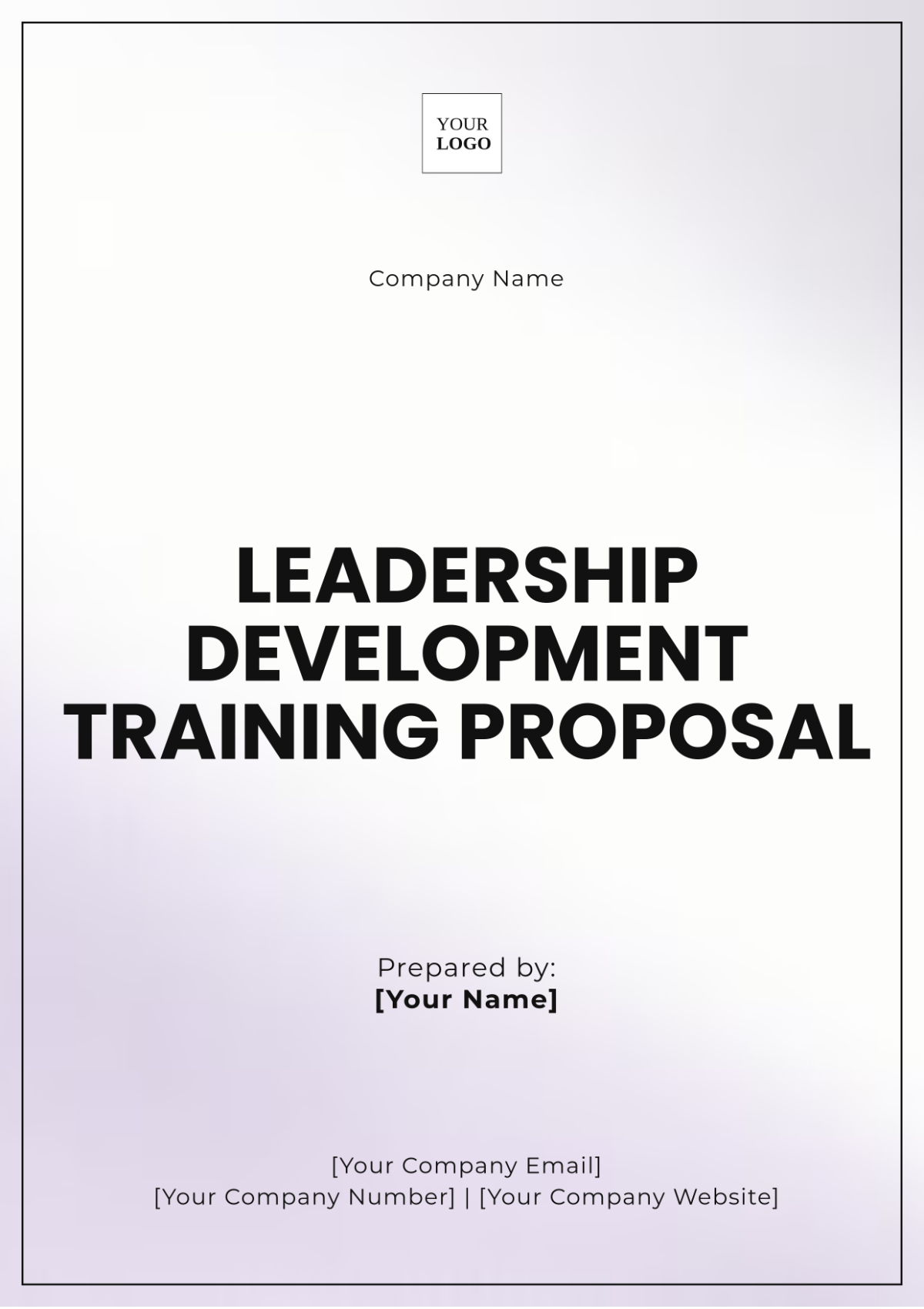
Prepared by: [Your Name]
Company: [Your Company Name]
Date: [Date]
I. Introduction
This Leadership Development Training Proposal is designed to elevate the leadership skills within our organization. By investing in structured training programs, we aim to cultivate a culture of leadership excellence, enhancing both individual growth and organizational success. Such training initiatives are tailored to address current gaps and foster the development of future leaders.
In today’s dynamic business environment, effective leadership is paramount for driving innovation, engagement, and performance. Our proposal focuses on equipping leaders with essential tools and strategies to thrive in their roles and align with the organization’s vision.
II. Needs Assessment
A. Current State
Our organization currently faces challenges in key leadership competencies, including communication, decision-making, and strategic thinking. Recent surveys and performance evaluations indicate a pressing need for comprehensive leadership training to bridge skill gaps.
Specific data points reveal that:
70% of employees feel their managers lack effective communication skills.
60% of leaders reported uncertainty in strategic decision-making during high-pressure situations.
Performance reviews highlighted a lack of emotional intelligence among managers, affecting team morale and collaboration.
B. Desired State
The desired outcome is to build a robust leadership pipeline that embodies the company's core values and strategic objectives. Through targeted training, we aim to equip potential leaders with essential skills and instill a culture of continuous improvement and innovation.
Our vision includes:
A 30% increase in employee engagement scores within six months post-training.
Improved performance metrics, resulting in a 15% enhancement in team productivity.
Development of a leadership cadre that drives initiatives aligned with our organizational mission and values.
III. Training Objectives
A. Enhance Communication Skills
Improve leaders' ability to communicate effectively across various platforms and with diverse teams.
Goal: Facilitate open and transparent dialogue that fosters trust and collaboration.
B. Develop Strategic Thinking
Foster aptitude in strategic planning and decision-making to align with organizational goals.
Goal: Equip leaders with analytical tools to anticipate market trends and respond proactively.
C. Strengthen Emotional Intelligence
Enhance self-awareness, empathy, and interpersonal skills to improve team dynamics and leadership effectiveness.
Goal: Create a supportive environment where leaders can connect with their teams, leading to higher morale and productivity.
IV. Training Methods
A. Workshops and Seminars
Interactive sessions led by industry experts focusing on real-world applications of leadership theories.
Format: Group discussions, role-playing scenarios, and case study analyses.
Outcome: Participants will leave with actionable strategies and enhanced networking opportunities.
B. Coaching and Mentorship
One-on-one and group coaching sessions to provide personalized guidance and support.
Format: Tailored sessions based on individual developmental needs and leadership challenges.
Outcome: Participants will receive feedback and support to refine their leadership styles and approaches.
C. Online Courses
Self-paced learning modules allow flexible access to foundational and advanced leadership concepts.
Content: Cover topics like conflict resolution, team dynamics, and innovative leadership practices.
Outcome: Participants can revisit materials as needed to reinforce their learning journey.
D. Method Overview
Method | Description | Frequency |
|---|---|---|
Workshops | Hands-on, scenario-based learning experiences. | Monthly |
Coaching | Customized developmental advice and feedback. | Bi-weekly |
Online Courses | Remote training is accessible according to individual pace. | As needed |
V. Timeline
The proposed timeline spans six months, effectively integrating training activities without overwhelming the participants. Key phases include:
Month 1: Program Kick-off and Enrollment
Introduction to the training program and participant onboarding.
Months 2-4: Core Training Sessions
Intensive workshops, coaching sessions, and online courses.
Month 5: Application and Feedback
Participants apply learned skills in real-world scenarios and receive feedback.
Month 6: Evaluation and Completion
Comprehensive assessment of the program's effectiveness and individual progress.
VI. Evaluation Plan
The evaluation plan includes continuous monitoring and assessment of participant engagement and learning outcomes. This involves:
Quarterly surveys and feedback forms
Gather insights on participant satisfaction and areas for improvement.
Performance assessments and leadership competency evaluations
Measure participants' growth in key competency areas.
Post-training analysis and reports
Analyze data to demonstrate the impact of the training on organizational performance.
VII. Budget
Expense Item | Cost |
|---|---|
Workshops & Seminars | $15,000 |
Coaching & Mentorship | $10,000 |
Online Course Subscriptions | $5,000 |
Evaluation & Assessment Tools | $2,000 |
Total | $32,000 |
A. Additional Budget Considerations
Marketing Materials: $1,500 (Promotional items to encourage participation)
Refreshments: $1,000 (Provided during workshops and seminars)
Facilitator Fees: $3,000 (Compensation for external trainers and speakers)
VIII. Benefits
Implementing this leadership development training is expected to yield significant advantages, including:
Increased productivity and efficiency
Empowered leaders who can drive results and motivate their teams.
Enhanced employee satisfaction and retention
A more engaged workforce that feels valued and invested in.
Improved cross-departmental collaboration
Leaders equipped to foster teamwork and synergy across functions.
Strengthened organizational reputation and competitiveness
Positioning the organization as an industry leader in talent development.
A. Long-term Impact
Over time, the organization can expect to see a more resilient leadership team, capable of adapting to change and navigating challenges effectively. This foundational investment in leadership training will contribute to sustained organizational success and growth.
IX. Conclusion
This Leadership Development Training Proposal presents a strategic initiative to reinforce our leadership capabilities. By investing in structured programs, we lay a solid foundation for sustained organizational growth and success. We recommend proceeding with the proposed plan to meet our leadership development objectives effectively.
- 100% Customizable, free editor
- Access 1 Million+ Templates, photo’s & graphics
- Download or share as a template
- Click and replace photos, graphics, text, backgrounds
- Resize, crop, AI write & more
- Access advanced editor
Empower future leaders with the Leadership Development Training Proposal Template from Template.net. This editable and customizable template enables you to outline leadership training programs designed to build essential decision-making and team management skills. It provides a clear structure for training objectives and outcomes, making it easy to customize for your organization. The template is also fully editable in our AI Editor Tool, allowing for seamless updates.
You may also like
- Business Proposal
- Research Proposal
- Proposal Request
- Project Proposal
- Grant Proposal
- Photography Proposal
- Job Proposal
- Budget Proposal
- Marketing Proposal
- Branding Proposal
- Advertising Proposal
- Sales Proposal
- Startup Proposal
- Event Proposal
- Creative Proposal
- Restaurant Proposal
- Blank Proposal
- One Page Proposal
- Proposal Report
- IT Proposal
- Non Profit Proposal
- Training Proposal
- Construction Proposal
- School Proposal
- Cleaning Proposal
- Contract Proposal
- HR Proposal
- Travel Agency Proposal
- Small Business Proposal
- Investment Proposal
- Bid Proposal
- Retail Business Proposal
- Sponsorship Proposal
- Academic Proposal
- Partnership Proposal
- Work Proposal
- Agency Proposal
- University Proposal
- Accounting Proposal
- Real Estate Proposal
- Hotel Proposal
- Product Proposal
- Advertising Agency Proposal
- Development Proposal
- Loan Proposal
- Website Proposal
- Nursing Home Proposal
- Financial Proposal
- Salon Proposal
- Freelancer Proposal
- Funding Proposal
- Work from Home Proposal
- Company Proposal
- Consulting Proposal
- Educational Proposal
- Construction Bid Proposal
- Interior Design Proposal
- New Product Proposal
- Sports Proposal
- Corporate Proposal
- Food Proposal
- Property Proposal
- Maintenance Proposal
- Purchase Proposal
- Rental Proposal
- Recruitment Proposal
- Social Media Proposal
- Travel Proposal
- Trip Proposal
- Software Proposal
- Conference Proposal
- Graphic Design Proposal
- Law Firm Proposal
- Medical Proposal
- Music Proposal
- Pricing Proposal
- SEO Proposal
- Strategy Proposal
- Technical Proposal
- Coaching Proposal
- Ecommerce Proposal
- Fundraising Proposal
- Landscaping Proposal
- Charity Proposal
- Contractor Proposal
- Exhibition Proposal
- Art Proposal
- Mobile Proposal
- Equipment Proposal
- Student Proposal
- Engineering Proposal
- Business Proposal
